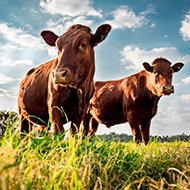
Report outlines recommendations to safeguard UK's high animal welfare standards.
BVA president James Russell has welcomed the publication of a Trade and Agriculture Commission (TAC) report, which sets out 22 recommendations for liberalising UK trade policy while safeguarding animal welfare standards.
The TAC was launched in July after concerns raised by the BVA and others that sub-standard food imports could undermine the UK's high animal welfare and environmental standards.
The UK government will now review the recommendations, and BVA is calling for clarity on how they will be implemented in time to influence current negotiations.
BVA president James Russell said: “The Commission was given a very difficult task and we welcome the recommendations made today which set out a sensible short- and long-term approach to safeguarding the UK’s high animal welfare and environmental standards in future trade deals.
“The Commission rightly recognises that UK consumers care about how their food is produced and they expect the food they buy to meet UK standards.”
He added: “In the short term, the Commission recommends that tariff-free access to the UK market within FTAs should only be granted to those goods that meet our standards. This is a good first step and it’s essential that the Government commits to this approach in the current trade negotiations.
“But the Commission also recognises that we must go further. We support the call for the UK Government to lobby internationally through the World Trade Organization for reform of global standards with a view to introducing trade restrictions on welfare grounds.
“The UK has an opportunity to lead on the raising of standards internationally. We can, and should be, assertive in spreading animal welfare norms through trade deals and in international forums, drawing on veterinary expertise.”



 The Federation of Independent Veterinary Practices (FIVP) has announced a third season of its podcast, Practice Matters.
The Federation of Independent Veterinary Practices (FIVP) has announced a third season of its podcast, Practice Matters.